Before You Answer That Question About The Bible

People have lots of questions about the Bible (as we’ve seen both here and here) I think they should. I have tons of questions about the Bible and I’ve been interacting with it for years.
But as people have asked me questions about the Bible, I’ve learned that you have to ask a lot of clarifying questions before answering, otherwise you risk answering the wrong question or answering the right question in a completely wrong and unhelpful way.
So here’s my recommendation: (1) Plot their range. (2) Make sure they’re asking a real question and that you have permission to answer it. (3) Don’t answer a question about “the Bible”.
1. Plot Their Ranges
In my experience, there are basically two key ranges a questioner sits in:
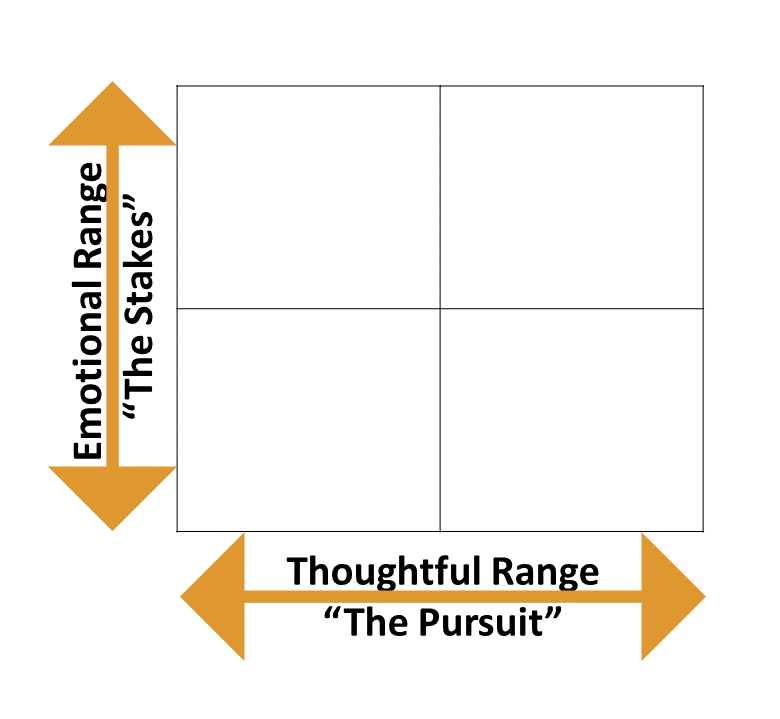
The first range is their emotional investment, or what we might call the stakes of the question. This is how much the question actually matters to the questioner. The second is the brain-power they’ve invested into it or the history of their pursuit of the question. How much time have they spent thinking or studying about this question?
At the edges of these ranges, we find four basic levels: Trivia to Angst and Beginner to Advanced: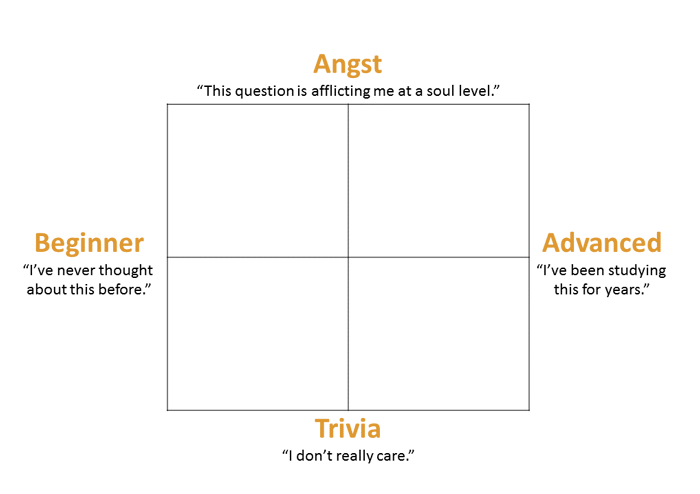
I don’t try to answer a question until I can plot the questioner on these ranges. Knowing how invested they are will help me know how careful and heart-felt our conversation needs to be.
Knowing how much they’ve been interacting with the question will help me know how technical we can get in the conversation.
Beware the Extra Care Zones
It’s not just the four corners that are the extremes; all of the the edges are extremes. And while all questions require care, when we get to towards the edges (and towards the middle), we need to be ready to offer some extra care:
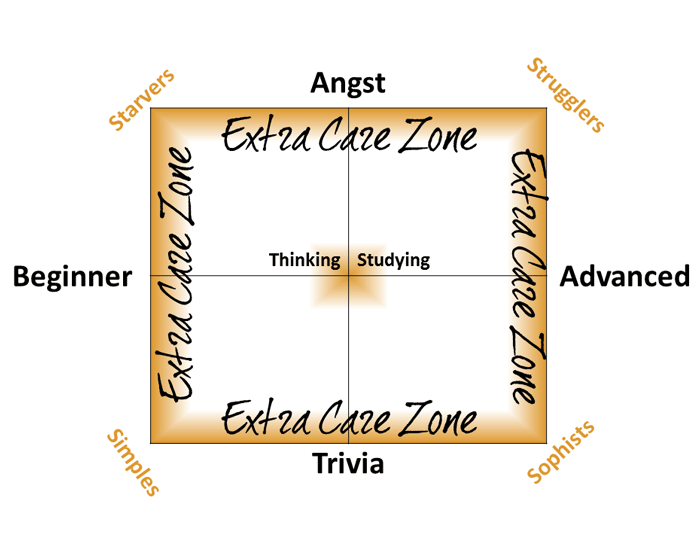
Extreme Angst Questioners: Personally, I can’t investigate a question with a high-level of angst in my life. If I’m freaking out, my judgment is impaired. So when extreme angst is in play, the conversation pivots to pastoral care more than a simple answer.
You can usually spot an extreme angst questioner be their tone of voice in combination with extremely moral subject matter: “Does God hate gay people?” or “Do people who commit suicide go to hell?” If somebody is asking those sort of questions, there’s a good chance the question has a history and stakes that are sky high.
Trivia Questioners: Apathy, in all its forms, requires extra attention. Why do we not care? Questions about the Bible are always important and always have significance of some kind. So when we find ourselves not really caring, something is wrong. We shouldn’t be flippant about these things; we should take them with the weight they deserve.
Advanced Questioners: On the other end of the spectrum are advanced students. These conversations tend to be difficult because both the questioner and the answerer have trouble listening –especially at the beginning of the conversation. The answerer may not realize they’re speaking with someone who actually knows what they’re talking about and so they answer on auto-pilot. The questioner feels this instinctively and usually thinks (and occasionally says), “Yeah, I know that; that’s not what I’m asking.”
The Cross-Over Questioner: An often overlooked category of questioner is somebody who needs to cross over from thinking about a question to studying a question. They’ve been given good enough fish, but now their appetites requires them to fish on their own. I find this is especially the case with my fellow cradle Christians who instinctively think there is an answer, but just don’t know how or where to find it.
And Watch The Four Corners
When these extremes start to blend in the corners, we meet some pretty common experiences: The Simple, The Sophist, The Starver, and the Struggler:
The Simple: have a mild curiosity about a question that probably popped into their head milliseconds before they asked it. In some cases they’ll even say, “Hey, I just thought about this.” or, “I’m just thinking out loud.” (I don’t intend “simple” as a pejorative. I’m a Simple on a lot of subjects).
The Sophist: is just as (un)invested in their question as The Simple but have actually spent quite a bit of time studying the question. They don’t actually care about the answer that much, but they do enjoy the Ping Pong of the discussion. To them, it’s all a game.
The Starver: has the opposite emotional experience of The Simple and the Sophist: Starvers care very much. They have a level of angst about their question but have absolutely no access to help. Their mental anemia has left them feeling completely helpless and hopeless and they don’t know what to do, where to go, or who can help. These questioners can make a very rough first-impression. But this may be the first time they’ve every tried to express themselves, that can make the interaction a little ham-handed.
The Struggler: has the same angst level as the Starver but the opposite experience: they feel helpless and hopeless because they have explored it all, sometimes for years. The fact that they’re asking a question means there’s still a small flicker of hope somewhere in them, even if they come off across as resigned or cynical.
Knowing these extremes is a huge help to answering a question effectively because we don’t actually answer questions, we answer people. In that way, we’re trying to figure out the question and the questioner. If we don’t answer both, we probably won’t answer either very well.
A Quick Guide to Responding to the Ranges
Assuming we’ve been able to adequately assess where the questioner is coming from, at a gut-level, I’d recommend the following:
Responding to Extreme Angst Questioners: Wisdom in this scenario is mission critical because two completely opposite responses might be the most helpful: Does the questioner need to take a time out or do they need to press through?
Last summer I interacted with two high-angst questioners, one of whom needed to be told to calm down and revisit the question after the storm had passed. The other just needed a quick walk through of some key verses and theologies and that’s what helped the storm pass.
In my own life, I’ve found this to be true as well. Sometimes things will bother me so much I have to hit the pause button and prayerfully consider why I’m so worked up (hint: it’s usually not the question that’s bothering me). Other times, just studying the question makes me realize I was freaking out unnecessarily and if I’d looked up the question earlier instead of asking it over and over and over again in my head, I could have rid myself of the stress much sooner.
Again, it’s about wisdom.
Responding to Trivia Questioners: It may help to establish some stakes and implications before diving into the question. What are some possible answers? What would they mean? How would they impact us in real life? The key is to show the abstract having real consequence so we don’t walk away feeling smart and like none of it matters.
Responding to a Beginner Student: When someone has no background in Biblical studies, it’s all very confusing and requires a slow, patient tour. The key to the response is to assume nothing. With a true beginner, it’s not about answering questions as much as it’s about building categories.
Responding to Advanced Questioners: We just have to listen. And just like with a beginner student, we should assume nothing. If an advanced student has really done their homework, they should be able to recite how they went about studying and what they found. That will be pretty cathartic for them (there’s a chance they feel pretty alone in their study) and really eye-opening for the answerer. As they tell their study story, some possible next steps should start to emerge: What question should be explored next? What lines of reasoning need a revisit or a total rework? Why should they read next? What key specialist in the field have they not interacted with yet?.
Beginner Questioners: For some of us, we can recite the major sections and genres of Scripture (Law, History, Poetry, Prophets, Gospels, Letters) without thinking and we think in the major systematic categories (Scripture, Sin, Salvation, End-Times) instinctively. The beginner student doesn’t have those instincts. I had a conversation with a student who was wrestling with salvation only because he’d never heard of a distinction between “justification” and “sanctification”. Can you imagine trying to be a faithful Christian without those categories? That’s the empathy we have to develop.
Responding to a Cross-Over Questioner: In my opinion, this is the most difficult kind of questioner. Someone who is advanced just needs to be pointed to better, more advanced resources. Cross-over questioners, on the other hand, are moving from thinking about something to actually studying it and that means training. But training has to be done in a course of study not in a conversation. The best that can be done in the short term is to point them to key terms and key resources –preferably training style resources. If they have a trustworthy thread to follow, it should at least start them on their way.
Responding to the Four Corners: For all four of these, I would respond as stated above, But I should also be sensitive to the blending that happens between the ranges (For example, it’s not just that a questioner is advanced; it’s that they’re advanced and angsty). That changes the tone of the conversation.
That’s a start, anyway. Again, all interactions of this sort predicate on wisdom. Our real goal here is to be listening and discerning. In that sense, there isn’t a “correct” response as much as there is an attentive and wise one.
2. Make Sure They’re Asking A Real Question and Get Permission to Answer It
Once we have a better understanding of the questioner, we can turn to gaining a better understanding of the question. Far too many people (myself included) jump right to download mode and forget to make sure that a real question has actually been asked. A lot of times, people aren’t asking questions, they’re raising objections or giving opinions.
While I find the above X/Y ranges to be incredibly helpful, I simply must check that an actual question is being asked and that I have the questioner’s permission to answer it.
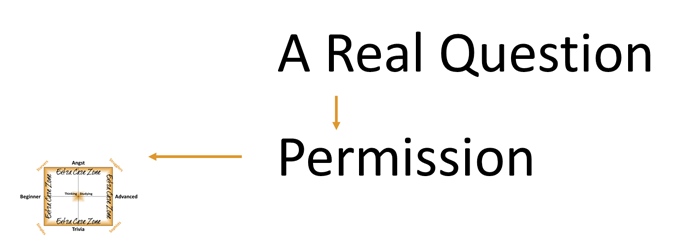
I think this flow chart is a good rule of thumb:
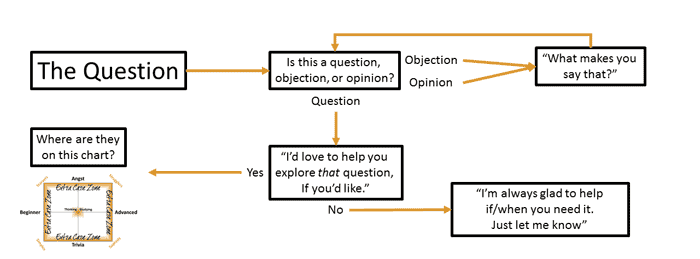
“But David,” some thoughtful person may ask, “Why would somebody ask you question if they didn’t want you to answer?” That, friend, is a question I’ve asked myself many, many times. But the reality is, we humans are weird. We have lots of motivations that can express themselves in seemingly contradictory ways. And in my experience, some people will ask a question not wanting an answer. Or not wanting me to answer.
Whatever the case, my street-wisdom advice is: never assume.
3. Don’t Answer a Question About “The Bible”
I don’t answer questions about “the Bible”. Ever. And really, nobody else does, either.
When people talk about “the Bible”, they often reference it that way: “I thought ‘the Bible’ say X?” “Wasn’t ‘the Bible” created at Nicea?” “‘the Bible’ defends slavary!”
The problem, of course, is that the Bible is way to big respond to in it’s entirety. We’ve seen the voluminous word counts for both the Hebrew Bible and New Testament, and the 31,103 verses in the NASB should demand that we not try to respond to it or discuss it in it’s entirely in a single conversation.
My position is that it is impossible to have a productive conversation about “the Bible”. The questioners mistakenly asking a question about “the Bible” are actually asking a question about parts of it. Therefore, before I’ll answer any question about “the Bible”, I will insist that we have a verse, passage or collection or verses to address specifically. I have lots of Bible apps on my phone and I almost always have a print edition in my backpack. So I can easily hand the text to the questioner and ask them to show me the passage that’s compelling the question.
If the questioner doesn’t know where the texts are, that’s totally fine. We can look it up together. But we certainly can’t discuss impressions of what “the Bible” says. We must have a specific text or texts in mind and in hand.
PRO TIP: This is the step I use to determine somebody’s beginner/advanced range. When someone says “the Bible” it’s a sign that they may be towards the left on the Beginning/Advanced range. People who have investigated a question almost always have a specific text in mind. So when I hear “the Bible” and, upon follow-up, learn learn that they don’t have any specific text in mind, it’s appropriate to see the question as a beginner-level question.
Beware Folly and Shame
If we’ve done these three simple things, we have a specific text in question, I know I have permission to help the questioner explore it, I know how much they’ve already explored it, and I know how invested they are in the outcome. Only with those things in place can we can have a productive conversation.
I love Proverbs 18:13, “To answer before listening– that is folly and shame.” To me, answering the question well is the last part of the challenge, The first three-quarters of the challenge is listening well. Again, never assume. When people come to us for answers, we can feel the pressured to drop an answer when we should first listen and explore.

Member discussion